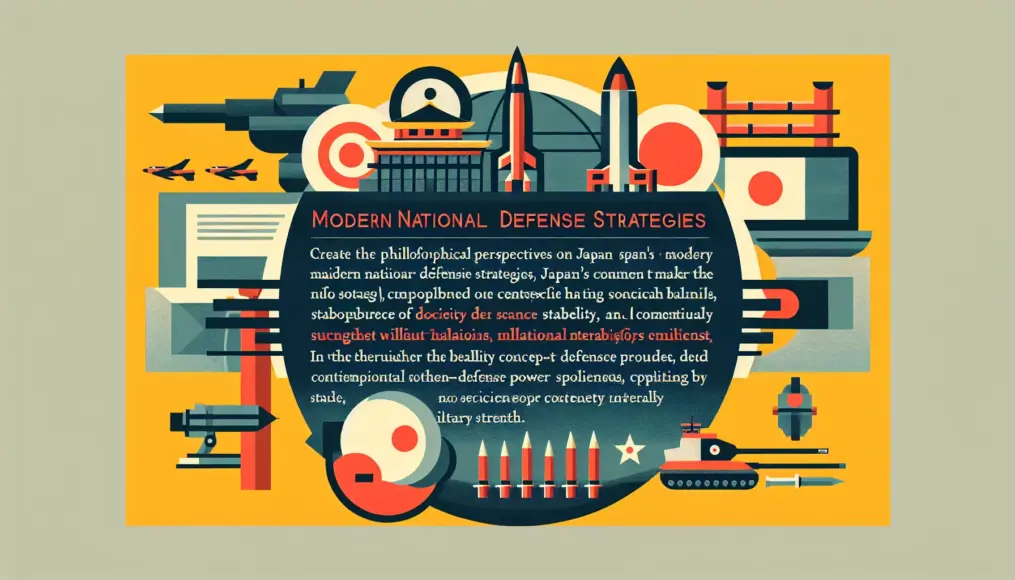In contemporary Japan, the concept of defense extends beyond mere military enhancement; it is a vital theme deeply rooted in the nation’s philosophy and strategy. Given the shifts in our international landscape and historical context, the significance of defense has never been more pronounced. This article aims to redefine the concept of defense philosophically and explore its evolution and future.
The notion of defense is continuously evolving alongside technological advancements and societal changes. So, what kind of defense capabilities should we aspire to achieve, and how do they influence our national strategy? Let’s delve into these questions together.
As we look towards the future, it’s crucial to reassess our defense capabilities from the perspectives of international cooperation and peacekeeping. We will explore the construction of a national strategy that is aligned with our vision for the future.
- Redefining the fundamental concepts of defense and its philosophical dimensions
- Examining the evolution of defense in light of historical contexts
- Sustainable outlooks on future defense capabilities and national strategy
What Is Defense Capability? A Philosophical Definition
Defense capability is widely recognized as the necessary strength to protect a nation’s security. However, this concept goes beyond just bolstering military power; it is deeply intertwined with a nation’s philosophy and strategy. To truly understand defense capability, we need to grasp its basic concepts and then redefine it from a philosophical perspective. In this section, we will delve into the core of defense capability and explore its meaning in depth.
The Basic Concept of Defense Capability
Defense capability refers to the ability of a nation or region to protect itself from external threats. This encompasses various elements, including military strength, intelligence gathering, and diplomacy. Defense capability is a critical factor directly linked to a nation’s survival, and enhancing or maintaining it is essential for the security of its citizens.
- Defense capability is the fundamental ability to protect a nation’s security.
- It includes not just military strength but also diplomacy and intelligence gathering.
- It is a crucial factor directly related to the nation’s survival.
A Philosophical Redefinition
From a philosophical standpoint, defense capability is not merely the exercise of power; it can also be seen as the result of choices grounded in ethics and values. How a nation chooses to exercise its defense capability is influenced by its ideals and historical context. For instance, a country that champions pacifism tends to consider non-military methods for its defense strategy. In this sense, defense capability also reflects the philosophical foundation of a nation.
- Defense capability is the result of choices based on ethics and values.
- A nation’s ideals and historical background influence its defense capability.
- Diverse approaches, such as pacifism, exist in how defense capability is conceived.
Historical Background and the Evolution of Defense Capabilities
Defense capabilities have evolved over time, particularly in post-war Japan, where changes in the international landscape have significantly influenced defense policies. This section explores how Japan has shaped its defense capabilities since the end of World War II and how shifts in global dynamics have contributed to this evolution.
Post-War Japan’s Defense Policy
Following the war, Japan’s defense policy has been grounded in pacifism. Article 9 of the Japanese Constitution renounces war and prohibits the use of force. As a result, Japan established the Self-Defense Forces (SDF), focusing on its own defense while maintaining a posture that avoids offensive military actions. This approach has been heavily influenced by the post-war international environment and Japan’s alliance with the United States.
- Japan’s defense policy is based on pacifism
- Article 9 prohibits the use of force
- The Self-Defense Forces maintain defensive capabilities without being offensive
Changes in the International Landscape and Their Impact
Since the Cold War, the international situation has been in constant flux. In particular, changes in the security environment in the Asia-Pacific region have affected Japan’s defense capabilities. Recently, North Korea’s nuclear development and China’s military rise have introduced new challenges to Japan’s defense policy. To address these threats, Japan’s defense capabilities continue to evolve.
- Changes in the international situation impact Japan’s defense capabilities
- North Korea’s nuclear development and China’s military rise present challenges
- Japan’s defense capabilities are evolving to respond to new threats
Challenges and Significance of Modern Defense Capabilities
Today’s defense capabilities are increasingly confronted with complex challenges due to technological innovations and shifts in the international landscape. In particular, the rise of cyber attacks and the evolution of unmanned systems are prompting a reevaluation of defense strategies. Moreover, it has become clear that merely strengthening military forces is insufficient for maintaining societal stability. In this section, we will explore the challenges facing modern defense capabilities and their significance.
Technological Innovations and Changes in Defense Strategy
The advancement of technology is reshaping the nature of defense capabilities. Developments in cyber warfare and drone technology are challenging traditional notions of warfare. As a result, there are growing instances where conventional defense strategies are no longer effective. Integrating new technologies is essential for bolstering a nation’s defense capabilities. Enhancing defense requires leveraging information technology and adopting new weapon systems.
- Technological advancements are transforming defense capabilities
- Cyber warfare and drone technology present new challenges
- The adoption of new technologies is crucial for strengthening defense
Defense Capabilities and Societal Stability
Defense capabilities are not just about military power; they are also a critical factor in maintaining societal stability. Strengthening defense enhances citizens’ sense of security and promotes social stability. Furthermore, through international cooperation, defense capabilities can contribute to peacekeeping efforts and humanitarian assistance. In this way, defense plays a significant role in fostering societal stability and development.
- Defense capabilities are essential for maintaining societal stability
- They play a role in enhancing citizens’ sense of security
- Contributing to peacekeeping efforts through international cooperation
The Future of Defense Capability and National Strategy
The future of defense capability is evolving towards a focus on sustainability and international cooperation. As we navigate technological innovations and shifts in global dynamics, there’s a growing demand not just for enhanced military power, but for sustainable strategies as well. This chapter delves into the construction of future defense capabilities and the necessity of maintaining peace through international collaboration.
Building Sustainable Defense Capabilities
Sustainable defense capabilities refer to the enhancement of defense forces in a manner that considers environmental and social impacts. Achieving this involves the efficient use of resources and technological advancements. Moreover, sustainable defense capabilities are crucial for maintaining long-term national security stability. Through international cooperation, nations can share sustainable technologies and support one another.
- Sustainable defense considers environmental and social factors.
- Efficient resource utilization is essential.
- It plays a vital role in maintaining long-term national security.
The Path to International Cooperation and Peacekeeping
The future of defense capabilities should be further strengthened through international cooperation. The threats facing the global community transcend borders, making it impractical to tackle them individually. By engaging in international frameworks for information sharing and joint training, nations can enhance their defense capabilities. Additionally, participating in peacekeeping operations is crucial for building international trust.
If you found this article on the importance of future defense capabilities and international cooperation intriguing, we also recommend exploring this article for a deeper understanding: “What is Defense Spending? Its Background and Impact on Modern Times.” This piece provides a detailed explanation of the role of defense spending and its historical context, offering essential insights for considering national strategy.
- International cooperation strengthens future defense capabilities.
- Sharing information to address cross-border threats is vital.
- Peacekeeping operations play a key role in building international trust.
Conclusion
In this article, we’ve explored the importance of defense capabilities through a philosophical lens, delving into historical contexts, contemporary challenges, and future perspectives. Defense is not merely about military strength; it’s a complex concept shaped by a nation’s ideals and the global landscape. We also highlighted the necessity of building sustainable defense systems and fostering international cooperation as essential components of future defense strategies.
The evolution of defense capabilities significantly impacts our society and international relations. Moving forward, defense policies will need to embrace technological innovations and international collaboration to create a safer and more sustainable world. This approach will enhance citizens’ sense of security and help maintain a stable society.
- Defense capabilities are a complex concept influenced by national ideals and international circumstances
- Building sustainable defense systems and international collaboration are key future challenges
- New defense strategies that incorporate technological innovations are essential
It’s crucial to understand and reflect on the importance of defense capabilities as we look to the future. We would love to hear your thoughts and opinions on this article, so please feel free to share your comments!



Comment